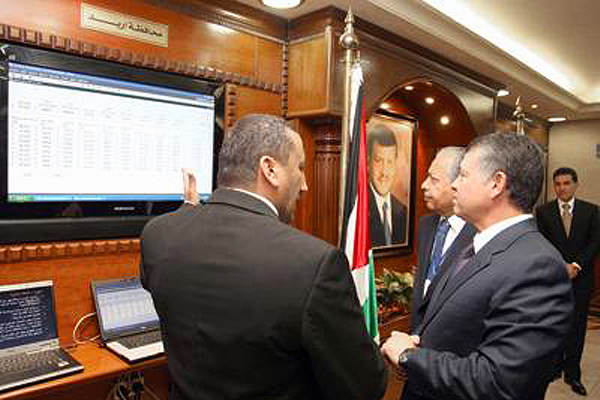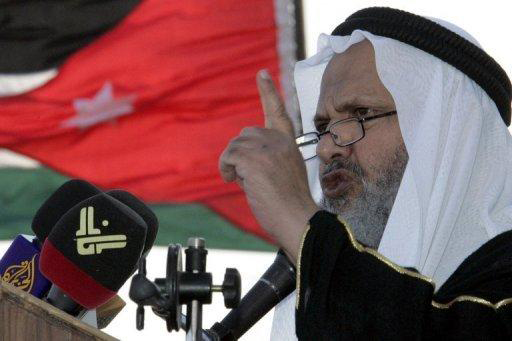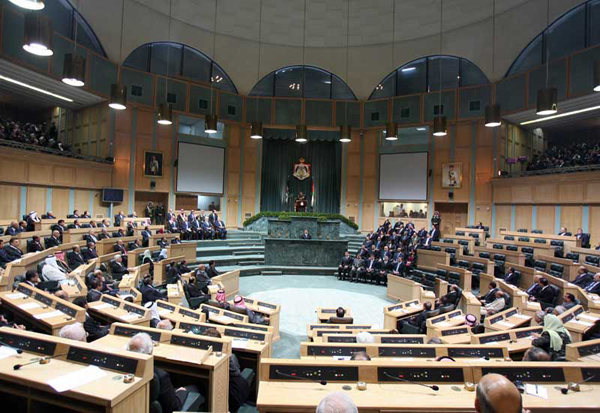Jordan Politics
Jordan is has a “strong kingdom” form of government, which is to say that, while it has a constitution and a partially elected parliament, the king has substantial control of the political process.

Jordan Politics
Content
>Jordan’s Government
>Parliamentary Elections 2010
>A Nation of Immigrants
Jordan’s Government
Jordan is has a “strong kingdom” form of government, which is to say that, while it has a constitution and a partially elected parliament, the king has substantial control of the political process. According to the constitution, the king appoints the prime minister, the cabinet, and all 55 members of parliament’s upper chamber. Only the 110 (recently increased to 120) members of the lower chamber are popularly elected, but even here the king prescribes the election law.
Although laws originate from the King and cabinet, the constitution provides that they must be approved by parliament. However, the King may promulgate laws by emergency decree when parliament is not sitting. When parliament has acted slowly in approving necessary reform laws sent to it, King Abdullah II has not hesitated to dissolve parliament, which was most recently done in November 2009, when the parliament elected in 2007 failed to act quickly. In the interim, King Abdullah has promulgated more than 100 laws by emergency decree.
Parliamentary Elections 2010
 National elections in many Arab countries (for example, Lebanon and Iraq) are customarily called “national weddings.” And so, on November 9, 2010, Jordan held an officially dubbed “national wedding” to replace the parliament dissolved the previous year. It produced few surprises. Pro-government loyalists won an overwhelming majority of seats.
National elections in many Arab countries (for example, Lebanon and Iraq) are customarily called “national weddings.” And so, on November 9, 2010, Jordan held an officially dubbed “national wedding” to replace the parliament dissolved the previous year. It produced few surprises. Pro-government loyalists won an overwhelming majority of seats.
There were few issues of substance in the election, with some commentators complaining of the banality of the election slogans. The one major issue in the election was the election law itself.
Both the Islamic Action Front and the Muslim Brotherhood, who together won 6 seats in the 2007 parliament, chose to boycott the election, claiming that the election was “rigged” by the designation of unequal election districts.
In brief, rural areas where people are more likely to vote for candidates favorable to the King are given more seats than urban areas where more people sympathetic to Palestinians live, thus allegedly violating the “one man, one vote” principle.
overall voter participation was 53%—considered a respectable turnout, this overall figure was achieved by turnouts as high as 80% in some tribal areas.
After the 2007 election, which was marred by charges of fraud and other irregularities, the government announced that it would overhaul the election law. But in advance of the 2010 election, only cosmetic changes were made.
Ten more districts were added to be distributed in cities to meet objections that the rural areas were over-represented, and the quota for women in the new 120 member parliament was raised from 10 to 12. However, these were insufficient to mollify the more radical Islamic factions.
 Nevertheless, despite the boycott, which appears to have reduced voting in many urban areas to as low as 30%, overall voter participation was 53%—considered a respectable turnout; this overall figure was achieved by turnouts as high as 80% in some tribal areas.
Nevertheless, despite the boycott, which appears to have reduced voting in many urban areas to as low as 30%, overall voter participation was 53%—considered a respectable turnout; this overall figure was achieved by turnouts as high as 80% in some tribal areas.
The government claimed to have done every thing it could to make the elections open, free, and democratic. Political parties were encouraged to participate, and individuals encouraged to run. A total of 853 would-be candidates filed applications, of whom 763 were deemed qualified to run (many who were nominated by others, or simply changed their minds, withdrew); political parties fielded 86 candidates, of whom 17 won seats.
International observers were invited to oversee the elections. These included 25 teams comprising 90 officials from EU diplomatic missions who were invited to tour polling centers on election day; the US National Democratic Institute (DNI); 250 international observers deployed by the National Centre for Human Rights and 3000 local observers from other Jordanian civil society organizations,
Of the newly elected members, 78 are new. In addition to the 12 women seats allotted by quota, a 13th woman, Reem Badran, was elected in her own right.
Of the newly elected members, 78 are new. In addition to the 12 women seats allotted by quota, a 13th woman, Reem Badran, was elected in her own right.
Now that the “national wedding” is over, the net result of the election is that the government and King will be able to efficiently continue their policies of attracting investment, developing resources and infrastructure, encouraging international trade, spurring growth, and modernizing the economy. Debate will continue over a future election law. Women will undoubtedly become more politically active.
And the foreign policy issues of concern to Jordanian citizens of Palestinian and Iraqi background will simmer in the background.
One of the most important factors to understand Jordanian politics is the fact that the majority of Jordan’s citizens are immigrants or descendants of immigrants. Circassians and Chechens have already been mentioned, but Jordan has also taken in large numbers of immigrants from surrounding countries, most recently refugees from the wars in Kuwait and Iraq.
However, the largest bloc of voters consists of the descendants of Palestinian refugees who immigrated to Jordan since 1948, who retain a deep interest in the fate of their brethren still living in the Palestinian West Bank. No king or politician, no matter how popular or economically progressive, can long survive without satisfactorily representing their aspirations and concerns.
The memory of the efforts of Palestinian fedayeen to take over the state of Jordan in the 1970s—still known as “Black September”— is still very strong. That failed coup de etat resulted in a civil war that had to be put down with considerable force. 
Abdullah II has met these concerns by becoming the most articulate Arab advocate of the rights of Palestinians still living in the West Bank. That advocacy, by both the present king and his predecessor, King Hussein, has enabled both king and government to survive even the peace settlements with Israel in 1988 and 1994, though many Palestinians in Jordan and elsewhere opposed any recognition of Israel.
This advocacy on behalf of the West Bank Palestinians is most evident in the foreign policy of Jordan.